
Introduction
Blockchain & Web3 Services Trusted By Leaders
- Develop innovative solutions using our state-of-the-art blockchain expertise.
- Achieve accelerated growth with robust & scalable Web3 consulting.
- Unlock 360-degree security with our top-rated blockchain development.
Blockchain Cybersecurity: Protecting Your Business With Blockchain Security
We are living in an age where a surge of cyber-attacks is common. Also, cybersecurity has become a critical concern for businesses of all sizes. In recent years, Blockchain has evolved as a revolutionary technology that is being hailed as a game-changer for cybersecurity. Blockchain is a decentralized and distributed digital ledger. It records transactions across a network of computers. Its tamper-proof nature has made it synonymous with security, as all transactions are recorded and cannot be altered or deleted. Businesses across different industries are increasingly adopting blockchain technology to ensure the security of their data. Through this article, we aim to show how blockchain can be a game-changer for cybersecurity in the current era and help businesses protect themselves from cyber threats. So, let’s dive in and explore the potential of blockchain in enhancing cybersecurity.What is Blockchain Cybersecurity?
Blockchain cybersecurity is actually the use of blockchain technology to ensure the security of data and transactions from cyber threats. It is a holistic approach to cybersecurity that seeks to prevent cyber-attacks by securing data using blockchain technology.What is the Importance of Cybersecurity in Blockchain?
Cybersecurity is a crucial aspect of blockchain technology. It involves the storage and transfer of sensitive data and assets. Blockchain provides a scalable, secure, and tamper-proof environment for data and assets. Therefore, it is an ideal solution for businesses seeking to protect their valuable assets from cyber-attacks.How Blockchain Ensures Cybersecurity?
- Blockchain provides a decentralized system for storing and transferring data.
- Each transaction is recorded on the blockchain, creating a permanent and immutable record.
- The use of cryptographic algorithms ensures the authenticity and integrity of the data, making it impossible to tamper with.
- It uses a consensus mechanism that ensures all nodes in the network agree on the validity of transactions.
- This consensus mechanism creates a trustless environment where no single entity controls the data, making it difficult for hackers to manipulate or compromise the system.
The Impact of Blockchain Cybersecurity on Businesses
Blockchain cybersecurity has a significant impact on businesses. Many thought leaders have already adopted blockchain for seamless operations in businesses. By adopting blockchain technology, businesses can ensure the security of their data and assets, protect themselves from cyber-attacks, and reduce the risk of data breaches. The use of blockchain technology for cybersecurity provides a robust and proactive approach to protecting businesses from cyber threats. As the world becomes increasingly digital, businesses that prioritize cybersecurity and adopt blockchain technology will be better positioned to thrive in the current era.
Advantages of Blockchain Development Services
Blockchain development services offer a range of advantages when it comes to cybersecurity. Blockchain has the ability to provide enhanced security services that can help businesses protect their assets from cyber-attacks. Let’s take a look at some of the benefits of blockchain security services:-
Improved Transparency and Traceability:
Blockchain provides an immutable and transparent record of all transactions, making it easier to track and verify data. This means that businesses can be sure that all their data is secure and can be easily traced if needed.
-
Reducing Cybercrime:
Blockchain technology’s tamper-proof nature and decentralized network make it difficult for hackers to compromise the system. It can also detect and prevent fraud in real-time, reducing the risk of cybercrime.
-
Cost-Effective Solutions:
Implementing blockchain security solutions can be more cost-effective than traditional cybersecurity measures. This is because blockchain reduces the need for intermediaries and can automate many of the processes involved in cybersecurity.
-
Reliable Security Measures:
Blockchain offers a range of security features that are highly reliable. These include cryptographic algorithms and digital signatures that ensure that all data is secure and cannot be altered without permission.

The Potential of Blockchain Technology for Cybersecurity
The potential of blockchain for cybersecurity is vast and varied. With its tamper-proof and immutable nature, blockchain can help businesses secure their data and protect it from cyber-attacks. It can also provide real-time monitoring and alerting of any suspicious activity on the network, helping businesses identify and prevent cyber-attacks before they happen.Blockchain as a Solution for Cybersecurity Issues
Blockchain technology has the potential to provide robust and secure solutions to some of the most challenging cybersecurity issues that businesses face. The decentralized nature of the blockchain makes it difficult for hackers to launch attacks on the system, as there is no single point of failure. This feature ensures the security of sensitive data, such as financial and personal information. Some of the features of blockchain technology and cybersecurity are mentioned below;-
Enhancing Data Protection
Blockchain technology can enhance data protection by providing an immutable and tamper-proof record of all transactions and interactions on the network. This feature ensures that all data is securely stored and can only be accessed by authorized parties. Moreover, blockchain can also provide enhanced encryption for data at rest and in transit, making it almost impossible for hackers to intercept and decipher data.
-
Blockchain Support in Network Security
Blockchain technology can also be used to improve network security. It can help businesses secure their networks by providing a decentralized and distributed system that is resilient to attacks. By leveraging blockchain, businesses can create a secure and transparent network that allows for real-time monitoring and detection of any suspicious activity. Blockchain can also enable secure and efficient data sharing between different entities on the network, without compromising the security of the data.
Which industry can use blockchain technology for security?
Blockchain technology has gained significant traction in the field of cybersecurity and various industries are able to see its potential applications. Here are some industries that can benefit from blockchain technology in terms of cybersecurity:-
Healthcare:
Blockchain can be used to secure electronic health records (EHRs) by providing a tamper-proof and immutable ledger of all transactions. This can prevent unauthorized access to sensitive patient data, ensuring that the data is accurate and secure.
-
Finance:
The finance industry can use blockchain to secure transactions, reduce fraud, and enhance data privacy. With blockchain, financial institutions can eliminate intermediaries, thus reducing costs and speeding up transactions.
-
Supply Chain Management:
Blockchain can be used to secure supply chains by tracking products from the point of origin to the point of consumption. This can prevent counterfeiting, reduce the risk of fraud, and ensure that products meet regulatory requirements.
-
Government:
Governments can use blockchain technology to secure sensitive data such as voting records, tax information, and public records. This can prevent unauthorized access, and tampering, and ensure the accuracy and transparency of government transactions.
The energy, retail, and education industry can also benefit from blockchain technology in terms of cybersecurity to enhance data privacy, reduce fraud, and improve transparency in transactions. Thus, Businesses can protect their valuable assets and mitigate the risk of cyber-attacks by getting their systems rebooted on the blockchain. As more industries adopt blockchain technology, we can expect to see more innovative solutions to the most pressing cybersecurity challenges facing businesses today.Challenges in Blockchain Cybersecurity
Despite its potential benefits, Blockchain cybersecurity is not without its challenges. Here are some of the main challenges that need to be addressed:-
Blockchain Cybersecurity Risks:
While Blockchain technology is considered secure, it is not completely immune to cyber-attacks. Some of the risks associated with it include Distributed Denial of Service (DDoS) attacks, 51% attacks, and Sybil attacks.
-
Possible solutions to overcome these challenges:
To address these challenges, businesses can implement various measures such as using multi-factor authentication, employing robust encryption techniques, and leveraging the power of artificial intelligence to identify and respond to potential threats in real time. Moreover, businesses can also adopt a proactive approach to cybersecurity by educating their employees about best practices for cybersecurity and conducting regular security audits.
Conclusion
Blockchain is revolutionizing cybersecurity for businesses in different industries. However, it is essential to be aware of the potential risks and challenges associated with it and take proactive measures to mitigate them which we have already mentioned in the blog above. Moreover, it is evident from the previous discussion and facts that blockchain has revolutionized the way businesses secure their data. By adopting Blockchain Security Services, businesses can improve transparency, reduce cybercrime, and ensure reliable security measures in a cost-effective manner. Therefore, it’s crucial for businesses to consider implementing Blockchain Security Services to mitigate cybersecurity risks. Follow BloxBytes for more insights!
Follow BloxBytes for more insights!